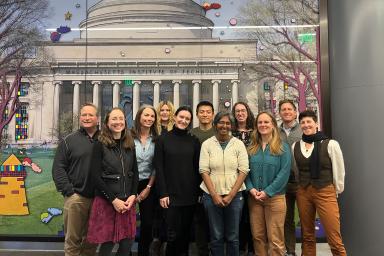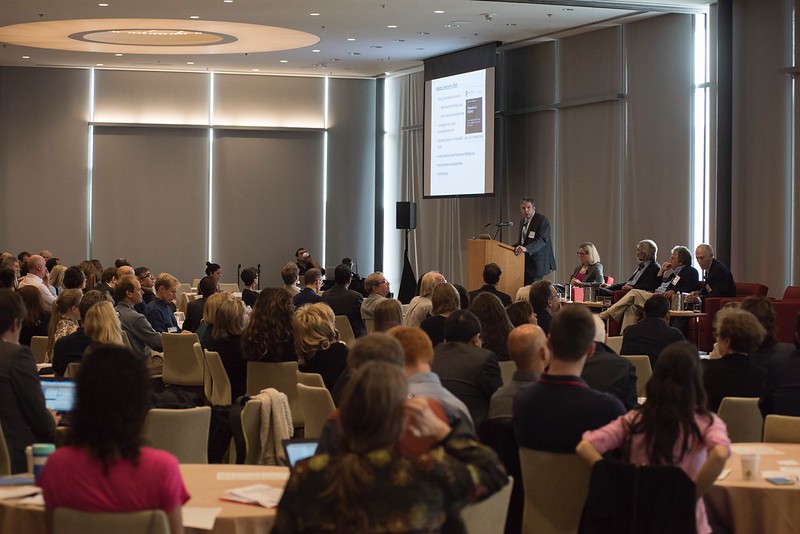
MITOS recognizes that the underlying challenges of sustainability are global – and require deep collaboration with regional, national, and global partners. The campus itself—while embedded in a distinct, urban community– is a truly global institution, educating, hosting, and employing thousands of international scholars, staff, and faculty.

The Scaling Climate Action & Sustainability in Higher Education Program, hosted by the MIT Office of Sustainability, offers a unique opportunity for higher education practitioners and scholars to engage deeply with MIT’s sustainability team. The program aims to enhance global sustainability efforts by fostering in-person dialogue and collaboration on strategic planning and climate action.This initiative is designed to facilitate the replication of successful projects, accelerate solutions, and build partnerships through direct interaction.
Connecting to communities of problem solvers across the Northeast and globe
MITOS actively participates in networks around the region and globe – working together on shared issues ranging from climate resiliency strategies to data and metrics. Read about the groups below.

The Northeast Campus Sustainability Consortium (NECSC)
NECSC was established in October 2004 to support sustainability officers in advancing education about and demonstration of sustainable systems on university campuses in the northeast and maritime region of the US and Canada.
Ivy Plus Sustainability Working Group
The Ivy Plus Sustainability working group is committed to the on-going exchange of campus sustainability solutions common to all of our campuses. Participants agreed that a unified effort on the part of the leading institutions of higher education to respond to one of the most pressing issues of our time, climate change, is essential. The Ivy Plus group is faced with the opportunity and responsibility to develop cutting edge model operations, engage top scholars and educate the future leaders on issues of sustainable development and climate change. The group was initially convened in 2007 and continues to meet on an annual basis at one of the participating institutions:
- Brown University
- Columbia University
- Cornell University
- Dartmouth College
- Duke University
- Georgetown University
- Harvard University
- Johns Hopkins University
- Massachusetts Institute of Technology
- Princeton University
- Stanford University
- The University of Chicago
- University of Pennsylvania
The International Sustainable Campus Network (ISCN)
MIT is an active member of the ISCN, working with our peers across the globe to devise and open source solutions for campus sustainability. ISCN is a global forum supporting leading colleges, universities, and corporate campuses in the exchange of information, ideas, and best practices for achieving sustainable campus operations and integrating sustainability in research and teaching.
Sustainability Fellows Exchange
Through the ISCN/MIT Sustainability Fellows Exchange, participants are able to develop a deeper understanding of one another’s sustainability efforts, challenges, opportunities, and visions at their respective institutions through a comprehensive, on-campus experience. Exchange programs may be tailored to meet the needs of participating institutions but often include a combination of topic specific meetings with staff throughout MIT, tours of the campus and the power plant, and extensive time with members of the MIT Office of the Sustainability along with opportunities to connect with other area universities. The work of the exchange continues after the on-campus visit through communication and other means fitting to the partnership.
MIT/PUCP Fellows Exchange
A Sustainability Fellows Exchange between MIT and Pontifica Universidad Catolica de Peru (PUCP) featured discussion of shared challenges and opportunities, and presentations both at MIT and the Encuentro Campus Sostenible at Universidad de San Buenaventura Cali - Colombia. Ideas from the exchange aided in the formalization of plans to launch an Office of Sustainability at PUCP in 2020. This exchange was also part of the development of an ISCN Latin America network to advance campus sustainability throughout the Americas by understanding what can be gained via cross cultural exchanges and support a roadmap for Office of Sustainability implementation among ISCN university members in Latin America region based on the success of PUCP.
To learn more about the Sustainability Fellows Exchange at MIT and share how your institution might benefit, please send an email explaining the interest of your university and purpose for the visit to: sustainfellows@mit.edu


